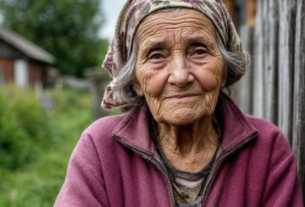Olga had always thought that being an adult meant you finally got to run your life the way you wanted. Like a real grown-up.
But here she was, standing in an office, holding a promotion order in her hands and feeling as if she were fifteen again. As if the school principal had just praised her for a dictation with no mistakes. Only now, instead of a top grade, she was getting a forty-percent salary increase, and the Excel tables lived not in a notebook but in her head, at night, when she couldn’t sleep.
“Well then, Olga Sergeevna, congratulations,” said Irina Borisovna from HR cheerfully. “Starting tomorrow, you’re deputy department head. All fair and square: you worked, you endured, you earned it.”
Olga signed and exhaled. It wasn’t like she had dreamed of this. It’s just that in eight years you get used to it: late meetings, a boss with a Napoleon complex, colleagues who shuffle papers like kids stacking blocks. And now here it was—recognition. Small, but her own.
On the way home — the usual route. Pyaterochka as always: milk, cheese, tomatoes. She grabbed shrimp without even looking — Sergey loves them. And wine. Nothing grand as a celebration, of course, but at least something.
At home, as usual, she was greeted not by a person, but by the TV. On the screen people were shooting, screaming. Sergey was sitting in an armchair, as if fused to the screen of his phone.
“Hi…” she said tiredly, kicking off her shoes.
“Mom was here. She’s waiting for you,” he replied without looking up.
“Which mom?” Olga put the bags down in the kitchen. “What are you even talking about? I just got back.”
Right on cue, the doorbell rang. Of course. Lidia Petrovna. As always — no declaration of war, but with a battle plan.
On the threshold she stood all radiant, in a beige coat and with the expression of someone who had come to receive a well-deserved medal for motherhood.
“Well, finally! I was starting to think you were hiding from me on purpose,” she chirped and swept past her like a hostess.
Shuffling in behind her was Valery Ivanovich. His eyes held a permanent longing for the life that had never quite happened.
“Sit down,” said Olga, not expecting anything good.
“Olechka, my dear,” began Lidia Petrovna in a sweet sing-song voice, “you’re an important person now, with a good position… And we, with little Valera here, well, you know — the ceiling’s leaking, the wiring hisses like a snake. In a word — disaster. And that’s all about safety. One spark and that’s it, everything up in flames…”
“And?” Olga asked dryly, feeling a throbbing start somewhere between her temples.
“Oh, it’s nothing! We were thinking — you could take out a loan. A small one. For the repairs. All for the family. Not for yourself, of course!”
Sergey, still glued to his screen, added:
“Yeah, it’s a normal idea. Mom and I did the math — it’s nothing, really.”
Olga froze.
“We?”
“Of course we!” perked up her mother-in-law. “Who else is supposed to think about you two? We’re one family!”
Olga felt something crack inside.
“Wait. Are you saying I’m supposed to take out a loan… to fix your apartment?”
“Well who else, Olechka? Valera’s retired, Sergey’s salary… you understand yourself. But you — you’re our support. The homemaker! A woman!”
Sergey finally raised his eyes:
“Why are you reacting like this? Twenty-five thousand a month is nothing at all.”
“And you decided all this… without me?”
“Olechka, why are you taking it so painfully?” Lidia widened her eyes. “We’re not your enemies. You just need to understand — family means responsibilities. Why are you so nervous? Maybe you should see a doctor?..”
And that was when something inside Olga finally snapped. Not loudly. But definitively.
“Seriously? I should see a doctor? Maybe you should see a GP. Or a psychiatrist, whoever’s handling your ‘we decided’ syndrome. Because ‘we decided’ — that’s already a diagnosis.”
“Olya!” exploded Sergey. “Why are you starting again?! Mom just made a suggestion!”
“A suggestion?! You two have already drafted a budget here while I was working!”
And then—no hysterics, no door-slamming—she stood up. She took a bag down from the closet. Just an ordinary travel bag. Not for a vacation — for an escape. She tossed in some clothes, a charger, a couple of books.
“What are you doing?!” panicked Lidia Petrovna. “Don’t make a drama out of it!”
“Olechka, come on now,” Sergey tried to get up.
“I need to catch my breath, Seryozha. Think. About who here is actually a person. And who owes what to whom.”
And she left. Down the stairs, out of habit counting the steps. Each step — like an extra thought. An extra resentment. An extra hope. All of it — gone past.
In the morning she woke up on Natasha’s couch. Under a throw blanket with the word “Love” on it — such a silly thing, cheap synthetic. But it was cozy. And most importantly — no one expected her to take out a loan for someone else’s ceiling.
“Well, combat-friend, congrats on your first victory!” Natasha came out with coffee. “Freedom, independence, and a couch thrown in.”
“I don’t need a divorce…” mumbled Olga. “Although… maybe that’s exactly what I need.”
“If I were you, I’d have thrown Sergey’s suitcase out onto the landing yesterday already. With a note: ‘I’ll be back when the ceiling fixes itself.’”
Olga smiled for the first time in twenty-four hours.
“It’s not just about the money. It’s about how they keep eating me with a spoon. As long as I agree — I’m good. The moment I say ‘no’ — I’m a hysteric.”
“Classic genre,” snorted Natasha. “I’ve starred in that movie. Ending — applause, curtain, and a mortgage in my name.”
Her phone beeped. A message from Sergey:
“When you come back, we’ll talk. Mom is worried. Don’t be selfish.”
Olga sighed.
“Natash, can I stay with you a couple more days? Until I figure out who I am without all this ‘family’.”
“Stay a whole year if you want. You’re like a sister to me. Just don’t turn into a second Lidia Petrovna, or I’ll throw you out.”
In the evening — a call. Then another. Then a message in caps:
“OLYA, WE NEED TO TALK SERIOUSLY. COME OVER.”
And she went. She had to finish this play. Or at least step out on stage and say the final line.
Sergey opened the door. He looked like a man who’d understood everything, but too late.
“Come in. Mom’s waiting.”
“Of course,” said Olga. “She’s always waiting for me. With new ideas.”
In the kitchen sat Lidia Petrovna. Ramrod straight, like an old wardrobe. Next to her, Valery Ivanovich was reading a newspaper. Convenient: the paper shielded him from reality.
“Olga,” said her mother-in-law, “we need to talk.”
“Oh, I’m all ears,” Olga replied and sat down. Without fear. Without hope. With a sense of her own place. And of the fact that from now on, things would be different.
She hadn’t come to fight. She was trying not to fight at all anymore. Too many years had gone into absorbing other people’s emotions, smoothing corners, searching for compromises that somehow never came out in her favor. But that evening Olga sat at the kitchen table — in the very apartment where everything had once begun — and for the first time in a long while felt like not a wife, not a daughter-in-law, not a “sweetie, you understand, don’t you” — but simply a person.
Across from her, Lidia sat as straight as if she were in the principal’s office. A teacup in her hands, eyes cold, lips pressed tight.
“I’ll be frank. You’re behaving improperly. You ran away. You abandoned your husband. You don’t want to help the family. Do you even realize you’re ruining your own life?”
Olga slowly set her cup down on the saucer and looked her straight in the eye.
“Right. Only you know what? It’s my life. And I’ll decide whether I ruin it or not.”
Sergey, sitting off to the side, squirmed in his chair as if the cushion beneath him had started to move.
“Olya, why are you starting again?..”
“Starting what? Telling the truth? Or standing up for my right not to live by your script?”
Lidia laced her fingers together as if praying—only not for world peace, but for the restoration of the old order.
“Very sad. Very. So… here’s how it’s going to be…” She made a theatrical pause and took a sip of tea. “If you’re not willing to take a loan and help the family, then… be so kind. Return everything you got thanks to our family. The ring. The gifts. The TV — we bought that with Valera together. The car — you and Sergey bought it together. So we split it. Half is ours.”
Olga felt as if she were hearing something not from this era at all. From some distant past where people weighed everything: who gave more, who owes whom.
“What half?” she asked slowly, feeling the warmth draining from her fingertips.
“Our half, Olechka,” Lidia replied calmly. “You don’t live here alone, do you. Everything is shared. Everything is family property.”
“Mom, that’s a bit much…” muttered Sergey.
“It’s not too much. We just need to remind this girl: responsibility isn’t only about earning money. It’s about sharing. Not just taking.”
Olga stood up. Everything was simple. No hysteria, no tears, not even resentment—just clarity. She walked over to the cabinet, took off her ring, and laid it on the table. Neatly. Without a tremor.
“The TV? Take it. The car? We’ll split it. The presents? Be my guest. Take the rug from the hallway too, if you like.”
Lidia narrowed her eyes.
“Excellent. When you’re left with nothing, then you’ll understand: family is sacred.”
Olga looked at Sergey. He was still silent. Lips pressed, hands in fists. No glance, no gesture.
And everything became clear.
“Sergey,” her voice trembled just a little, but it was firm, “tomorrow I’m filing for divorce. I can’t live like this anymore. And I don’t want to. Live. However you know how.”
She turned, grabbed her jacket.
“And the loan…” she added from the doorway, “you can apply for it yourselves. You’re the family, after all.”
He caught up with her at the entrance to the building.
“Olya, wait. Hold on.”
“What?”
“You’re really going to take it this far… all the way?”
“How did you imagine it? That I’d spend one night at Natasha’s, cool down, come back, forget everything — and we’d go on living like nothing happened?”
“Well… yeah.”
“Sorry. But I’m done being the sponsor of your family enterprise. And honestly — I can’t do it anymore.”
Sergey hunched his shoulders, kicked a small stone with his foot.
“You won’t manage on your own…”
“You’re wrong. On my own — I will. It’s next to you that I can’t.”
She walked away. Without looking back. Without regret.
That evening her phone vibrated endlessly. Messages from Lidia poured in like peas on a hardwood floor:
“Don’t you dare file for divorce, you’ll regret it!”
“We’ll make sure you don’t get a single kopeck!”
“Where exactly do you think you’re going to live, I wonder?”
Natasha, snorting, poured tea:
“Olya, honey, this is just the beginning. It’s going to get fun.”
And indeed.
The next morning — a call from the bank.
“Olga Sergeevna, a consumer credit application has been submitted in your name. Do you confirm it?”
“Excuse me… what?”
“It was submitted remotely. Did you actually apply for it?”
“No. That wasn’t me.”
Her hands started to shake. Her voice too. But inside, a new Olga was already forming. One who didn’t stay silent.
The following days were like a battle. Calls to the bank, explanations, endless “we’ll pass this on, we’ll check,” ten business days of waiting.
“What are you going to do in that time, put a house in my name?” she snapped in one of the calls. “I didn’t apply for any loan!”
Natasha poured her coffee like a soldier spooning out porridge before a fight.
“Now you’re at war. Welcome.”
“I even know who submitted it. And from which computer.”
“File a report. Fraud. And hire a lawyer. Not some kind auntie in glasses — someone the prosecutor avoids looking in the eye.”
The police captain’s office was dim, smelling of dust and old furniture.
“So… who could have applied for the credit?”
“My mother-in-law. Almost ex.”
“And how could she do that?”
“We had one laptop at home. All the info was accessible. Even the passwords.”
“Well, we’ll take your statement. But the case will take time. And there may be no result. Family ties aren’t exactly a crime syndicate.”
Olga smiled without smiling.
“I’ll see it through. I’ll go on TV if I have to. I’ll go to parliament. I’ll stand in the main square with a sign.”
“Oh, you’re a serious lady.”
“No. I’m an adult.”
That evening — a call from Lidia. Olga picked up. Just in time to hear:
“You shouldn’t have started a war, Olga. We know about your money transfers to your mummy. We know everything!”
“So what? She’s my mother. A pensioner. I helped her. And you wouldn’t even let her cross your threshold.”
“You spent family money without your husband’s consent! Return it! All of it!”
Olga hung up. And suddenly burst out laughing. Out loud. Bitterly, but almost with relief.
“Crazy. Collectible-grade crazy.”
A call from Sergey two days later:
“What are you doing? You went to the police?! Now we’re disgraced! My parents are disgraced!”
“Taking out a loan in someone else’s name without consent is a criminal offense. Just so you know.”
“No one was milking you! You’re just ungrateful!”
“Goodbye, Sergey. I hope your mom finds you a new investor.”
The court hearing went off like any other workday. Twenty minutes. Papers. Signatures. Period.
They sold the car — split the money. The TV went to Sergey. Olga kept the ring. As a symbol of what would never be again.
That evening — a notary’s office. A new account. In her own name.
For the future.
“Well, you’re a free woman now,” Natasha clinked glasses with her. “How does it feel?”
Olga looked out the window. Evening. People. Cars. Life.
“Light. Like I can breathe again.”
A month later a letter came. The handwriting — unmistakable, with little flourishes. Lidia Petrovna.
“Olga! We’ve thought it over. You’re still family. Let’s start over. We forgive you.”
Olga read the letter. Slowly, calmly. Then she tore it up into tiny pieces. Threw them in the trash.
“No, Lidia Petrovna. Never again.”
And she put the kettle on



